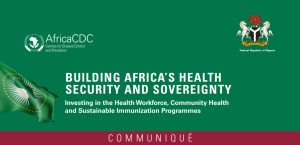As the world continues to grapple with emerging and re-emerging health threats, the Kingdom of Eswatini has taken a decisive step towards strengthening its epidemic intelligence systems with the launch of its National Event-Based Surveillance (EBS) Guidelines.
The new framework, developed by the Ministry of Health with support from the Africa Centres for Disease Control and Prevention (Africa CDC) and the World Health Organization (WHO), marks a major milestone in Eswatini’s journey towards a resilient, responsive, and community-centred health system.
The EBS Guidelines come at a critical time for Eswatini, a nation that has recently faced several public-health challenges, including outbreaks of cholera, measles, and COVID-19, as well as sporadic cases of anthrax and influenza-like illnesses. These events have underscored the urgent need for early detection and rapid-response mechanisms that transcend traditional health-facility surveillance.
“The launch of the Event-Based Surveillance Guidelines is a critical step in ensuring that no outbreak catches us unprepared,” said Honourable Mduduzi Matsebula, Minister of Health. “These guidelines will enable health workers and communities to detect and report events early, helping us respond faster, save lives, and protect livelihoods.”
Eswatini’s EBS approach is uniquely adapted to its national context and builds upon the lessons learned during recent outbreaks, he added.
“These guidelines are a home-grown solution, tailored to Eswatini’s unique context, reflecting our collective commitment to protecting the public health of the people of the Kingdom of Eswatini,” said Honourable Matsebula.
The EBS system operates by collecting and verifying reports of unusual health events from diverse sources, such as media reports, community observations, schools, and even social networks. This approach complements traditional indicator-based surveillance systems, providing real-time intelligence that can trigger early public-health action.
The introduction of EBS aligns with broader continental and global frameworks aimed at strengthening epidemic preparedness. It supports Africa CDC’s New Public Health Order, which calls for stronger surveillance, workforce development, and resilient national public-health institutions.
Dr Lul Riek, Regional Director for Southern Africa at Africa CDC, hailed Eswatini’s achievement as a model of regional cooperation and proactive health security.
“EBS is a core pillar of Africa CDC’s vision for a safer, healthier, and more resilient Africa,” said Dr Riek. “Through event-based surveillance, we move from passive data collection to active, real-time intelligence gathering, anticipating and stopping outbreaks before they escalate. This is what the New Public Health Order envisions: African-led, data-driven action to protect our people.”
Globally, the initiative reinforces Eswatini’s obligations under the International Health Regulations (IHR 2005), which require Member States to establish and maintain the capacity to detect, assess, report, and respond to public-health events of international concern. The EBS system provides the infrastructure to meet these requirements through improved event verification, timely notification, and community engagement.
Eswatini’s EBS launch follows similar initiatives in Namibia, Botswana, Zimbabwe, Lesotho, Malawi, and Zambia, as part of a coordinated regional effort supported by Africa CDC to harmonise surveillance across Southern Africa. The goal is to build a networked, interoperable early-warning system capable of sharing data, expertise, and alerts across borders, ensuring that no country is left behind.
“Regional health security depends on the strength of each country’s surveillance capacity,” said Dr Susan Tembo, WHO Country Representative to Eswatini. “With these guidelines, Eswatini is demonstrating leadership in advancing community-centred surveillance. WHO remains committed to supporting this journey in line with the IHR and the Global Health Security Agenda.”
At its core, the EBS approach empowers communities to become active participants in safeguarding public health. Health workers, local leaders, and citizens will receive training to identify and report unusual health events, transforming communities into the first line of defence against outbreaks.
The Ministry of Health has outlined plans to integrate EBS into the national disease-surveillance system, strengthen coordination among ministries and partners, and deploy digital tools to enhance reporting and verification.
“Our aim is to build resilience at the community level so that citizens become active participants in safeguarding national health security,” said Minister Matsebula.
With these guidelines, Eswatini is now better positioned to operationalise a community-centred, evidence-driven approach to epidemic intelligence, one that not only responds to outbreaks but also prevents them. The initiative embodies the spirit of collaboration championed by the African Union, Africa CDC, and WHO, demonstrating that regional solidarity and early action are key to achieving health security for all.
As Eswatini strengthens its surveillance infrastructure, it sets a powerful example for other nations, showing that investment in early-warning systems is not just a technical exercise but a moral imperative to protect lives, livelihoods, and the future of public health in Africa.







